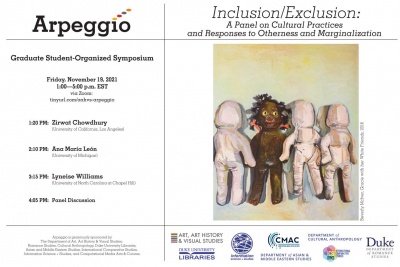Arpeggio Symposium

November 19, 1:00pm - November 19, 5:00pm
Speaker(s): Zirwat Chowdhury (University of California, Los Angeles), Ana María León (University of Michigan), Lyneise Williams (The University of North Carolina at Chapel Hill), with introductory remarks by Richard J. Powell, John Spencer Bassett Professor of Art & Art History, Duke University
In the aftermath of the Black Lives Matter protests against racial injustice, we are compelled to examine how culture can perpetuate structures of exclusion and violence. The built environment, visual media, as well as hegemonic intellectual discourse and cultural institutions have long been complicit in the "Othering" of those whose skin color, gender, sexuality, age, nationality, ability or religion (among other identities) have challenged the status quo. How have individuals and collectivities relegated to the margins responded to the epistemic violences of the canon? And how can we dismantle the normative assumptions of our disciplines in order to work toward justice and equality in representation, both visual and political? These are some of the guiding questions of this year's Arpeggio symposium. This panel will bring together three guest speakers - specialists in art and architectural history - who prioritize marginalized perspectives and whose work makes valuable contributions to deconstructing mechanisms of exclusion experienced in visual and material cultural production across time and place.
Speaker(s): Zirwat Chowdhury (University of California, Los Angeles), Ana María León (University of Michigan), Lyneise Williams (The University of North Carolina at Chapel Hill), with introductory remarks by Richard J. Powell, John Spencer Bassett Professor of Art & Art History, Duke University
In the aftermath of the Black Lives Matter protests against racial injustice, we are compelled to examine how culture can perpetuate structures of exclusion and violence. The built environment, visual media, as well as hegemonic intellectual discourse and cultural institutions have long been complicit in the "Othering" of those whose skin color, gender, sexuality, age, nationality, ability or religion (among other identities) have challenged the status quo. How have individuals and collectivities relegated to the margins responded to the epistemic violences of the canon? And how can we dismantle the normative assumptions of our disciplines in order to work toward justice and equality in representation, both visual and political? These are some of the guiding questions of this year's Arpeggio symposium. This panel will bring together three guest speakers - specialists in art and architectural history - who prioritize marginalized perspectives and whose work makes valuable contributions to deconstructing mechanisms of exclusion experienced in visual and material cultural production across time and place.